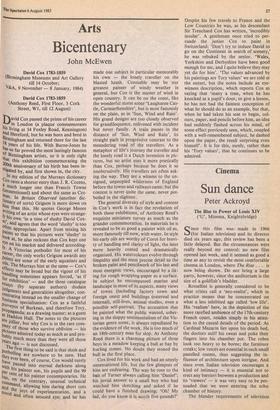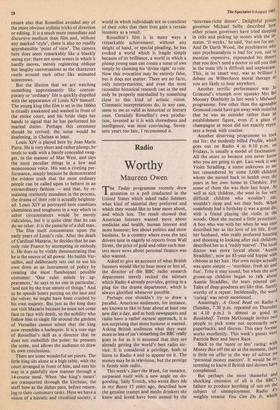Cinema
Sun dance
Peter Ackroyd
The Rise to Power of Louis XIV ('U', Minema, Knightsbridge)
Q ince this film was, made in 1966 1.../(for Italian television) and its director died six years ago, this review has been a little delayed. But the circumstances were really beyond my control: no new film opened last week, and it seemed as good a time as any to revisit the most comfortable cinema in London, where The Rise . . . is now being shown. Do not bring a large party, however, since the auditorium is the size of a goldfish's bladder.
Rossellini is generally considered to be what critics call a 'neo-realist', which in practice means that he concentrated on what a less inhibited age called low life'. His 'realism' here, in the depiction of the more rarefied ambience of the 17th-century French court, resides simply in his atten- tion to the casual details of the period. As Cardinal Mazarin lies upon his death bed, the doctors sniff his sweat and poke their fingers into his chamber pot. The robes look too heavy to be borne; the furniture creaks; low voices are essential in such small panelled rooms, thus suggesting the in- fluence of architecture upon intrigue. And since even Italian television encourages a kind of intimacy — it is essential not to erect any barriers between a production and its 'viewers' — it was very easy to be per- suaded that we were entering the echo chamber of history.
The blander requirements of television
ensure also that Rossellini avoided any of the more obvious stylistic tricks of direction or editing. It is a much more immediate and discursive medium than film and, without any marked 'style', there is also no readily apprehensible 'point of view'. The camera here does seem remarkably like a blankly seeing eye: there are some scenes in which it hardly moves, merely registering oblique but lengthy conversations as the characters rustle around each other like animated scarecrows. But the illusion that we are watching something approximately like contem- porary or 'ordinary' life is quickly dispelled with the appearance of Louis XIV himself. The young king (the film is set in the 1660s) is ritually awakened and washed in front of the entire court, and his bride claps her hands to signal that he has performed his marital duties. Perhaps this ceremony should be revived: the noise would be deafening, in Chelsea at least. Louis XIV is played here by Jean-Marie Patte. He is very short and rather plump; he tends to walk with a barely concealed swag- ger, in the manner of Mae West, and says the most peculiar things in a low and monotonous voice. His was a riveting per- formance, simply because he demonstrated the evident truth that the most ordinary people can be called upon to behave in an extraordinary fashion — and that, by re- maining resolutely mundane in the process, the drama of their role is actually heighten- ed. Louis XIV as portrayed here combines clumsiness and toughness in a way which in other circumstances would be merely ridiculous, but it is quite clear that he can do no other, It is the panache of a dull man. The film itself concentrates upon the early years of Louis's rule. After the death of Cardinal Mazarin, he decides that he can only rule France by attempting to embody it. He does so by visibly demonstrating that he is the source of all power. He builds Ver- sailles, and deliberately sets out to use his own dress as an instrument of policy by creating the most flamboyant possible costumes: 'One rules minds by ap- pearances,' he says to no one in particular, `and not by the true nature of things.' And so he spends hours putting on the lace and the velvet: he might have been crushed by his own majesty. But just as the king does not visit Mazarin because he must not come face to face with death, so the nobility who follow him in single file around the gardens of Versailles cannot admit that the king now resembles a harlequin. It is a sure sign
of Rossellini's skill as a director that he does not embellish the point: he presents the scene, and allows the audience to draw its own conclusions.
There are some wonderful set pieces. The little king sits alone at a high table, with the court arranged in front of him, and eats his way in a painfully slow manner through a 14-course meal. When 'the king's meats' are transported through the kitchens, the staff bow as the dishes pass, before return- ing to their customary tasks. Here we have a vision of a hieratic and ritualised society, a world in which individuals are so conscious of their roles that their lives gain a certain intensity as a result. Rossellini's film is in many ways a remarkable achievement: without any sleight of hand, or special pleading, he has evoked a world which is fragile simply because of its brilliance, a world in which a plump young man can create a sense of awe simply by claiming his 'divine right' to rule. Now this evocation may be entirely false, but it dogs not matter. There are no facts, only interpretations, and even the most recondite historical research can in the end only be properly marshalled by something close to this kind of artistic vision, Cinematic interpretations do, in any case, seem to me as valid as historical or literary ones. Certainly Rossellini's own produc- tion, invested as it is with shrewdness and intelligence, was most convincing. Seven- teen years too late, I recommend it.







































 Previous page
Previous page